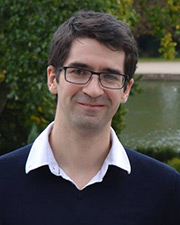Research on how our brains remember, store new words published in Nature Communications

Recent research on how the brain encodes and stores different words, led by Oscar Woolnough, PhD, assistant professor in the Vivian L. Smith Department of Neurosurgery, has been published in Nature Communications.
The paper, “Memorability of novel words correlates with anterior fusiform activity during reading,” is authored by Woolnough and Nitin Tandon, MD, professor in the Vivian L. Smith Department of Neurosurgery and chief of the epilepsy surgery program at Memorial Hermann.
Woolnough’s team explored how we encounter and remember new words, which can significantly impact our ability to recall names, new medications, and learn new vocabulary. The study aimed to understand what makes us more likely to remember or forget these new words.
“We get exposed to new words all the time, learning an average of one new word every two days as an adult,” Woolnough said.
The researchers tested more than 1,800 participants on their ability to remember new made-up words they were seeing for the first time, including nonsense words from classic literature authors like Roald Dahl, Dr. Seuss, and Lewis Carroll. Additionally, they recorded activity directly from the surface of the brain in 36 neurosurgical patients to map the neural processes involved.
Results of the research showed that some words are consistently more memorable than others, with successful recall of the most memorable words about six times more likely than the most forgettable. The most memorable words often resemble rare words we already know, like “sombat” and “cuckao.” Additionally, words like “unzie” and “jubjub” containing uncommon letter pairs were also more memorable. It was observed that it takes people longer to determine that more memorable nonsense words are not real, suggesting we perceive them as more ‘word-like.’
The results suggest that the brain uses its existing vocabulary as a framework to help encode and store new words. This is particularly relevant as many new words added to dictionaries, such as “rizz,” “yeet,” “janky,” and “adorkable,” follow these patterns, indicating that more memorable words are more likely to become part of our collective language.
“We see that some new words are inherently easier for our brains to remember than others. Our existing internal mental dictionary appears to act as a scaffold to help support our memory of new words,” Woolnough said.
Electrical recordings in one of the brain’s memory centers also identified a specific region of the brain that is sensitive to how memorable or forgettable these words are. This discovery highlights the importance of this brain area in our ability to remember new words and suggests it plays a critical role in the early stages of learning new vocabulary.
Moving forward, Woolnough’s research will focus on how disruptions in this brain area, such as epilepsy or Alzheimer’s disease, affect word learning and memory, and explore strategies to create more memorable names for objects.